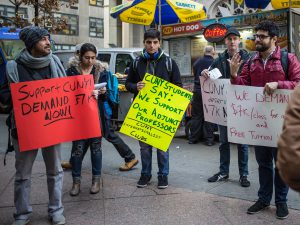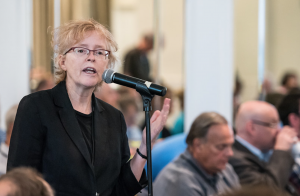
Professors can expect a new contract to be made public in the coming days. On Oct 19, Barbara Bowen, president of PSC-CUNY, announced that the bargaining team has struck a deal for a new contract with the Board of Trustees.
“The bargaining teams of the PSC and CUNY management reached an agreement in principle on a new contract,” wrote Bowen in a recent email to union delegates. “Expect an announcement with more information within the next few days.”
Once released, this contract will be the culmination of two years of bargaining between the Union and Board of Trustees. A contingent of the union, $7k or Strike, is putting pressure on the union for significant raises for adjuncts. The adjuncts, currently paid an average of $3,200 per course, want $7,000 or they will strike. If this contract meets the demands of adjuncts it will be the largest pay increase in a single contract ever.

This significant pay raise is meant to make up for the dwindling raises in contracts from the last 20 years. According to BMCC Adjunct Alan Bouville, the pay is barely enough to live off alone so many professors need to supplement their income. “I have five or six jobs including this one and none provide a living wage [alone],” said Bouville. Bouville teaches two courses and cobbles together a living wage working various freelance jobs.
“We live in one of the most expensive cities in the world,” said Jane Guskin, an adjunct at Queens College. “This wage isn’t livable here.”
This announcement is just a teaser for what union members are really looking for, an actual contract. Bowen made a promise to have a contract by the Oct. 10 which never materialized. Now, Bowen is doubling down on a deadline that keeps shifting further and further back.
The executive council cancelled the Oct 17 delegate assembly meeting because the bargaining team was working through the night to secure a contract. “We’re a complicated bargaining unit. We have a lot of issues on this contract,” said Union President Bowen. “We’ve been waiting for Cuomo and Deblasio to be aligned. We’ve also been waiting for a contract that has significant raises across the board and significant raises for adjuncts.”
Finalizing a union contract has a lot of steps. There are a lot of people that need to sign off on the contract before it can be released. Once the negotiations between the union and the CUNY Board of Trustees are complete, the contract needs approval from the Governor Andrew Cuomo and Mayor Bill de Blasio. After this, the Union Executive Council signs the contract and it’s publicly released. If any changes are made to the contract, it needs to go through a process of approval and reapproval. If the contract passes these stages, the Executive Council brings it before the delegate assembly for ratification. After the contract is ratified, all 33,000 union members vote on the contract.
For two years the union has been waiting for these negotiations and now that it’s in its final stages union members are hoping it won’t drag on.
Many professors want an expedient process so they can reap the benefits of any raises or developments now. “At least on my campus people have been talking about the contract already for over a year now. We had a chapter meeting and the first thing we talked about was the contract update,” Michael Batson, a delegate from the College of Staten Island. “My sense on my campus is that people I represent would like this to be expedited.”
But, there are many members who don’t see how this contract can meet the demands of the union activists, $7k or Strike. One of the biggest questions union members are asking is where is the money for these pay increases going to come from? “There’s no way [the bargaining team] can meet our demands [for $7,000] without cutting costs elsewhere,” said Jane Guskin, adjunct in Urban Studies at Queens College.
The pay increase isn’t the only demand. “We want a free and fully funded CUNY,” said Guskin.
Around the country teachers are striking for better pay and working conditions and $7k or Strike wants CUNY to follow suit. Activists of $7k or Strike would rather strike than compromise their demands. “At this point we have no other power than to withhold our labor,” said Andy Battle, former Hunter Adjunct in the history department.
The delegates are fearful of striking because of The Taylor Law, which mandates that any striking public employees will not be paid for days they strike, in addition to other penalties.
The delegates voted down a rally to bolster support for $7k. “The timing is too late to address this problem,” said Felipe Pimentel, a delegate from Hostos Community College. “The [contract] is almost done.” This statement was made after the latest news about the contract in September. Ultimately, Bowen’s announcement deterred activists while there was still time for action.
Although many union members feel there’s no need for action. The Bargaining Team negotiates behind closed doors, so the members don’t know what’s in the contract before its released. A lot of professors are concerned the Bargaining Team is compromising activists demands while others have a little more faith they’ll come back with something worthwhile. “I am prepared to support anything our negotiating team comes back with,” said John Gallagher, BMCC delegate. “It might not be everything we asked for, but we can trust those people.” The Bargaining Team is formed by representatives from different job titles to ensure fair representation. The team is made up of full-time professors, adjuncts, administrators, etc.
But these concessions from the delegates haven’t deterred $7k or Strike activists on the grassroots level. Four campus chapters of the PSC at the Graduate Center, BMCC, Bronx Community College, and Queens College resolved to authorize a strike. More chapters will be voting on this resolution in the near future. Hunter College’s vote is scheduled for Nov. 6.
At this point some adjuncts believe they risk more by not taking action. In 2018, West Virginian Teachers struck with a penalty similar to the Taylor Law but won anyway and their penalty was forgiven. $7k or Strike Activists want their demands whatever the costs may be. “You don’t pay into the Taylor Law if you win,” said Battle.
